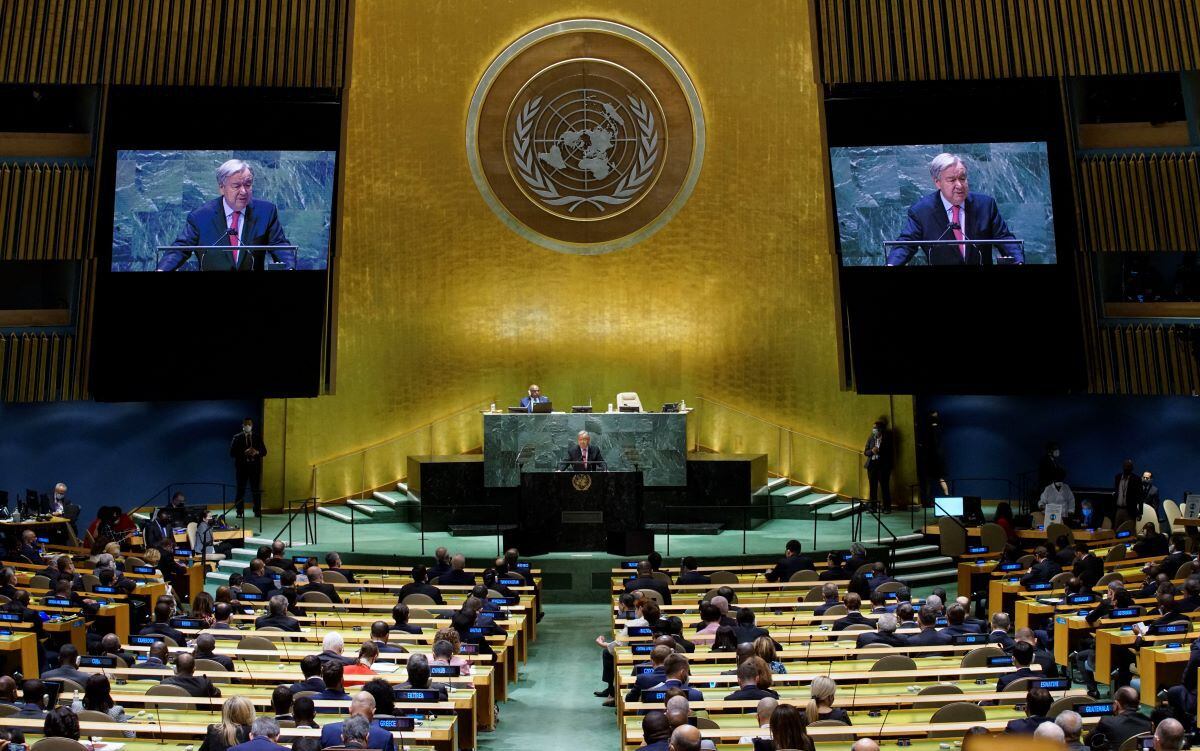
“Enough already! The fighting must stop”, launched the UN Secretary General, Antonio Guterres, after the opening this Monday of the extraordinary emergency session of the General Assembly that will decide whether or not to condemn Russia’s invasion of Ukraine, after the failure of the Council of security.
This exceptional meeting of the 193 members of the UN, the first of its kind in 40 years, began with a minute of silence in memory of the victims of the conflict that began on February 24 with the Russian invasion of Ukraine.
“If Ukraine does not survive, let us not be surprised if democracy fails,” said the Ukrainian ambassador to the UN, Sergiy Kyslytsya. “Save the United Nations, save democracy and defend the values we believe in,” he implored in a grave speech.
Under the title “Russia’s unprovoked armed aggression against Ukraine”, the draft resolution that will be put to a vote in the Assembly, promoted by the Europeans in coordination with Kiev and obtained by AFP, “condemns in the strongest terms the Russian aggression against Ukraine.
“War is not the answer,” Guterres recalled before stressing that “we need peace now.”
The text is similar to the one presented by the United States and Albania and rejected by a Russian veto in the Security Council on Friday. It calls for the immediate withdrawal of Russian troops from Ukraine and an end to the fighting.
Its authors hope to exceed a hundred favorable votes in the Assembly, where there is no right of veto.
In the Security Council, the African and Latin American countries (Mexico and Brazil) supported the denunciation of the invasion made by the United States and Europe. In the General Assembly, Moscow’s usual backers – Syria, Cuba, China, India, Venezuela, Nicaragua, among others – are expected to support Russian policy or abstain from voting.
The special session of the General Assembly – which has occurred about a dozen times in the history of the UN – will be a barometer of the evolution of the world, according to diplomats.
In recent years, autocratic regimes, military or not, such as Russia, Burma, Sudan, Mali, Burkina Faso, Venezuela or Nicaragua, seem to be gaining ground against democracies.
“The extent of the invasion shows that Vladimir Putin’s intention is to occupy the country, destroy democracy (in Ukraine) and install a puppet government in Kiev,” Josep Borell, a senior representative of the European Union for Foreign Affairs, who noted on Monday that the Russian invasion is “increasingly brutal.”
protect civilians
In the short term, the UN is going to focus on the humanitarian crisis triggered by the Russian invasion. The United States and the European Union anticipate that the conflict could displace between five million and seven million people.
Meanwhile, France called an emergency meeting of the Security Council for this Monday at 3:00 p.m., with the aim of adopting a resolution on Tuesday in favor of the “cessation of hostilities”, “the protection of civilians” and that “allows” the arrival of humanitarian aid “without obstacles”.
Since the invasion began, Russia has wielded the “legitimate defense” provided for in article 51 of the United Nations Charter. Having deployed tens of thousands of troops in and around Ukraine, with tanks, fighter jets and ships, Putin on Sunday implicitly evoked the nuclear threat to bring Ukraine to its knees, provoking outrage from the United States and Europe.
Moscow assured that it is only targeting military targets, a statement rejected by Westerners and the UN, which counted a number of civilian victims and attacks on civilian infrastructure that could be assimilated to war crimes.
“This is a pattern of President Putin that we have seen throughout this conflict: fabricating threats that don’t exist to justify further aggression,” White House press secretary Jen Psaki told ABC after the decision. of the Russian president to place his nuclear deterrent forces on high alert.
Russia’s argument for self-defense was categorically rejected by Westerners as well as by the UN, which accuses Moscow of violating Article 2 of the UN Charter, which requires its members to refrain from any threat or use of force to settle a dispute. crisis.
Source: Gestion
Ricardo is a renowned author and journalist, known for his exceptional writing on top-news stories. He currently works as a writer at the 247 News Agency, where he is known for his ability to deliver breaking news and insightful analysis on the most pressing issues of the day.












